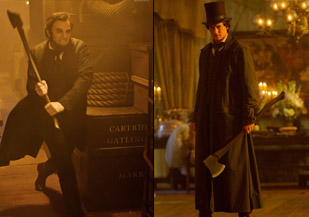Book vs. Movie
Abraham Lincoln, Vampire Hunter
By Russ Bickerstaff
June 28, 2012
Seth Graham-Smith's novel distinguishes itself from the rest of the genre in that it mixes historical narratives with shlocky contemporary vampire fiction with startling purity. The pairing of the two types of narrative is interesting. Graham-Smith carefully fuses true history with this alternate one in a way that clearly shows the seams between the two.
Early on, we are introduced to a young Lincoln. It turns out a great many vampires had come over to the United States from Europe with the explosion of cities in the US. Lincoln's mother dies. When Lincoln discovers that his mother was killed by a vampire, the young Abraham vows to become a vampire hunter. He reads, he studies up on any text he can find about vampires. He trains himself. And he finds himself woefully underprepared.
Lincoln's life is saved by a vampire when he finds himself in over his head on one particular hunt. The vampire captures Lincoln, allaying his fears as he has decided that the young man is too interesting to kill. He decides to take him under his leathery wing as a vampire Hunter.
Lincoln reluctantly goes to work killing off rival vampires for the gentleman. The events of Lincoln's life play out against the shadow of vampires. Throughout the novel, the narrative flits back-and-forth between historical accounts and standard vampire fiction. The civil war was fueled by vampires who wanted to maintain slavery for an easy food supply. In the end, there's the revalation that John Wilkes Booth was a vampire. The novel gets a little weird from there.
The book alternates between quite implicitly labeled fiction and non-fiction with such a steady alteration that it actually makes the premise seem vaguely believable in its own way. And that's probably Graeme-Smith's greatest success, because beyond that, there really isn't that much going on here. Lost somewhere between history and vampires, the novel isn't really successful at delivering either with any strong sense of purpose. Not that there isn't SOME sense of purpose.
Grahame-Smith seems to be shooting for something of a thematic sequel to Bram Stoker's original Dracula here. That novel was about a vampire monarch in the old world. In Dracula, evil is seen as an ancient tyrant. In Grahame-Smith's novel, vampires come to the new world and use the African-American slaves of the new world for food. Grahame-Smith updates the evil. It's an interesting exercise, but rather than exploring the evils of human slavery and institutionalized exploitation, the novel never really does anything with the deeper implications of the theme. Instead, it seems content to do its little illusions with historical texts… and so the evils of slavery end up feeling kind of trivialized in places. This really is kind of a pity, as Abraham Lincoln: Vampire Hunter is a pretty competently-written novel, but without anything more to animate it than novelty, it ends up feeling like a cheap gimmick - fun and even provocative, but never living up to its potential.
Continued:
1
2
3




